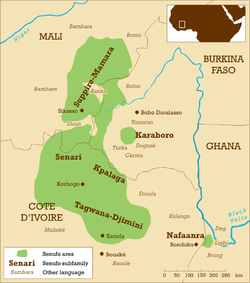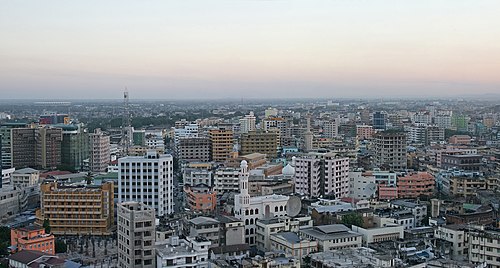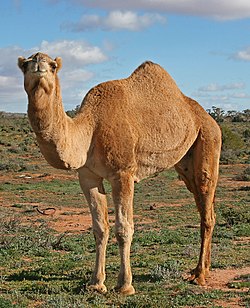Portal:Africa



Africa is the world's second-largest and second-most populous continent after Asia. At about 30.3 million km2 (11.7 million square miles) including adjacent islands, it covers 20% of Earth's land area and 6% of its total surface area. With nearly 1.4 billion people as of 2021, it accounts for about 18% of the world's human population. Africa's population is the youngest among all the continents; the median age in 2012 was 19.7, when the worldwide median age was 30.4. Based on 2024 projections, Africa's population will exceed 3.8 billion people by 2100. Africa is the least wealthy inhabited continent per capita and second-least wealthy by total wealth, ahead of Oceania. Scholars have attributed this to different factors including geography, climate, corruption, colonialism, the Cold War, and neocolonialism. Despite this low concentration of wealth, recent economic expansion and a large and young population make Africa an important economic market in the broader global context, and Africa has a large quantity of natural resources.
Africa is highly biodiverse; it is the continent with the largest number of megafauna species, as it was least affected by the extinction of the Pleistocene megafauna. However, Africa is also heavily affected by a wide range of environmental issues, including desertification, deforestation, water scarcity, and pollution. These entrenched environmental concerns are expected to worsen as climate change impacts Africa. The UN Intergovernmental Panel on Climate Change has identified Africa as the continent most vulnerable to climate change.
The history of Africa is long, complex, and varied, and has often been under-appreciated by the global historical community. In African societies the oral word is revered, and they have generally recorded their history via oral tradition, which has led anthropologists to term them "oral civilisations", contrasted with "literate civilisations" which pride the written word. African culture is rich and diverse both within and between the continent's regions, encompassing art, cuisine, music and dance, religion, and dress.
Africa, particularly Eastern Africa, is widely accepted to be the place of origin of humans and the Hominidae clade, also known as the great apes. The earliest hominids and their ancestors have been dated to around 7 million years ago, and Homo sapiens (modern human) are believed to have originated in Africa 350,000 to 260,000 years ago. In the 4th and 3rd millennia BCE Ancient Egypt, Kerma, Punt, and the Tichitt Tradition emerged in North, East and West Africa, while from 3000 BCE to 500 CE the Bantu expansion swept from modern-day Cameroon through Central, East, and Southern Africa, displacing or absorbing groups such as the Khoisan and Pygmies. Some African empires include Wagadu, Mali, Songhai, Sokoto, Ife, Benin, Asante, the Fatimids, Almoravids, Almohads, Ayyubids, Mamluks, Kongo, Mwene Muji, Luba, Lunda, Kitara, Aksum, Ethiopia, Adal, Ajuran, Kilwa, Sakalava, Imerina, Maravi, Mutapa, Rozvi, Mthwakazi, and Zulu. Despite the predominance of states, many societies were heterarchical and stateless. Slave trades created various diasporas, especially in the Americas. From the late 19th century to early 20th century, driven by the Second Industrial Revolution, most of Africa was rapidly conquered and colonised by European nations, save for Ethiopia and Liberia. European rule had significant impacts on Africa's societies, and colonies were maintained for the purpose of economic exploitation and extraction of natural resources. Most present states emerged from a process of decolonisation following World War II, and established the Organisation of African Unity in 1963, the predecessor to the African Union. The nascent countries decided to keep their colonial borders, with traditional power structures used in governance to varying degrees. (Full article...)
Selected article –
The Battle of Adwa (Amharic: የዐድዋ ጦርነት; Tigrinya: ውግእ ዓድዋ; Italian: battaglia di Adua, also spelled Adowa) was the climactic battle of the First Italo-Ethiopian War. The Ethiopian army defeated an invading Italian and Eritrean force led by Oreste Baratieri on March 1, 1896, near the town of Adwa. The victory, aided by vastly superior numbers, decisively thwarted the Kingdom of Italy's attempt to expand its colonial empire in the Horn of Africa. As a result, by the end of the 19th century Ethiopia was the only independent country left in Africa, which had otherwise been carved up by European powers following the Berlin Conference. Adwa became a pre-eminent symbol of pan-Africanism and secured Ethiopian sovereignty until the Second Italo-Ethiopian War forty years later. (Full article...)
Featured pictures –
Did you know (auto-generated) -

- ... that Freedom of Religion South Africa filed an unsuccessful lawsuit to keep child spanking legal?
- ... that the catalogue for Tanzania. Masterworks of African Sculpture highlighted traditional artworks such as a Sukuma mask?
- ... that South African mayor Marlene van Staden was re-elected through a coin toss?
- ... that South African president Jacob Zuma requested a tour of a Sainsbury's supermarket during his state visit to the United Kingdom in 2010?
- ... that African porters in Salvador, Bahia, went on strike after the provincial government passed a law requiring them to wear metal identification tags?
- ... that Central City College was established as an African American-led alternative to the historically black Atlanta Baptist College?
Categories
Selected biography –
Barthélemy Boganda (c. 1910 – 29 March 1959) was a Central African politician and independence activist. Boganda was active prior to his country's independence, during the period when the area, part of French Equatorial Africa, was administered by France under the name of Oubangui-Chari. He served as the first Premier of the Central African Republic as an autonomous territory.
Boganda was born into a family of farmers, and was adopted and educated by Roman Catholic missionaries after the death of his parents. In 1938, he was ordained as a Roman Catholic priest. During World War II, Boganda served in a number of missions and afterwards was persuaded by the Bishop of Bangui to enter politics. In 1946, he became the first Oubanguian elected to the National Assembly of France, where he spoke out against racism and the abuses of the colonial regime. He then returned to Oubangui-Chari to form a political organisation, culminating in the 1949 foundation of the Movement for the Social Evolution of Black Africa (MESAN), which became popular among villagers and the peasantry. Boganda was laicized from the priesthood after developing a relationship with and eventually marrying Michelle Jourdain, a parliamentary secretary. Nonetheless, he continued to advocate for equal treatment and fundamental rights for blacks in the territory well into the 1950s. As France conceded measures of representation to its colonies, MESAN won local elections and he gained influence in Oubangui-Chari's government, though his reputation suffered when he backed an unsuccessful economic scheme. (Full article...)
Selected country –
 |
 |
||

| |||
The Republic of the Congo (French: République du Congo; Kongo: Repubilika ya Kongo; Lingala: Republiki ya Kongó), also known as Congo-Brazzaville, is a former French colony of western-central Africa. Upon independence in 1960, the former French region of Middle Congo became the Republic of the Congo. A quarter century of Marxism was abandoned in 1990 and a democratically elected government installed in 1992. A brief civil war in 1997 restored former Marxist President Denis Sassou Nguesso.
The Republic of the Congo borders the Democratic Republic of the Congo to the south and east, Gabon to the west, Cameroon and the Central African Republic to the north, and Cabinda (Angola) and the Gulf of Guinea to the southwest. The southwest of the country is a coastal plain for which the primary drainage is the Kouilou-Niari River; the interior consists of a central plateau between two basins to the south and north. The capital, Brazzaville, is located on the Congo River, in the south of the country, immediately across from Kinshasa, the capital of the Democratic Republic of the Congo. (Read more...)
Selected city –
Nairobi is the capital and largest city of Kenya. The city lies in the south central part of Kenya, at an elevation of 1,795 metres (5,889 ft). The name is derived from the Maasai phrase Enkare Nairobi, which translates to 'place of cool waters', a reference to the Nairobi River which flows through the city. The city proper had a population of 4,397,073 in the 2019 census.
Nairobi is home of the Kenyan Parliament Buildings and hosts thousands of Kenyan businesses and key international companies and organisations, including the United Nations Environment Programme (UN Environment) and the United Nations Office at Nairobi (UNON). Nairobi is an established hub for business and culture. The Nairobi Securities Exchange (NSE) is one of the largest stock exchanges in Africa and the second-oldest exchange on the continent. It is Africa's fourth-largest stock exchange in terms of trading volume, capable of making 10 million trades a day. It also contains the Nairobi National Park. Nairobi joined the UNESCO Global Network of Learning Cities in 2010. (Full article...)
In the news
- 10 April 2025 – Land reform in Zimbabwe
- Zimbabwe begins issuing the first financial compensation payments to White Zimbabwean farmers whose farms were seized by Robert Mugabe's government between 2000 and 2002. A total of 740 farmers will be compensated as per the 2020 agreement with the Commercial Farmers' Union. (BBC News)
- 8 April 2025 –
- The death toll from the heavy flooding in Kinshasa, Democratic Republic of the Congo, caused by overflow of the Ndjili River increases to 33 deaths. Hundreds of buildings are completely submerged and thousands of people are trapped in their homes. (NPR) (DW)
- About 50 hippos are killed by anthrax poisoning at Virunga National Park in the Democratic Republic of the Congo. (CTV News)
- 8 April 2025 – 2024 Democratic Republic of the Congo coup attempt, Democratic Republic of the Congo–United States relations
- Three U.S. citizens have their sentences for attempting a coup against the Congolese President Félix Tshisekedi in 2024 commuted and are extradited back to the United States. They were previously sentenced to death along with 34 others for the failed attempt that killed six people, including the coup's leader Christian Malanga. (NPR)
- 7 April 2025 – Herder–farmer conflicts in Nigeria
- The National Emergency Management Agency reports that at least 52 people have been killed and over 2,000 others have been displaced from their homes in recent days in tit for tat attacks by rival herders over control of arable land in Plateau State, Nigeria. (Reuters)
- 7 April 2025 – Algeria–Mali relations
- Algeria bans flights to and from Mali in response to "recurrent violations" of Algerian airspace by Malian military drones. (Reuters)
Updated: 5:05, 11 April 2025
General images -
Africa topics
More did you know –
- ... that Safi Faye's 1975 film Kaddu Beykat was the first commercially distributed feature film made by a Sub-Saharan African woman?
- ... that legendary princess Yennenga, the "mother" of the Mossi people, was such a great warrior that her father refused to allow her to marry?
- ... that Safi Faye is a Senegalese film director whose work is better known in Europe than in her native Africa?
- ...that Mohamed Camara's 1997 film Dakan was the first West African film to explore homosexuality?
Related portals
Major Religions in Africa
North Africa
West Africa
Central Africa
East Africa
Southern Africa
Associated Wikimedia
The following Wikimedia Foundation sister projects provide more on this subject:
-
Commons
Free media repository -
Wikibooks
Free textbooks and manuals -
Wikidata
Free knowledge base -
Wikinews
Free-content news -
Wikiquote
Collection of quotations -
Wikisource
Free-content library -
Wikispecies
Directory of species -
Wikiversity
Free learning tools -
Wikivoyage
Free travel guide -
Wiktionary
Dictionary and thesaurus




























































































